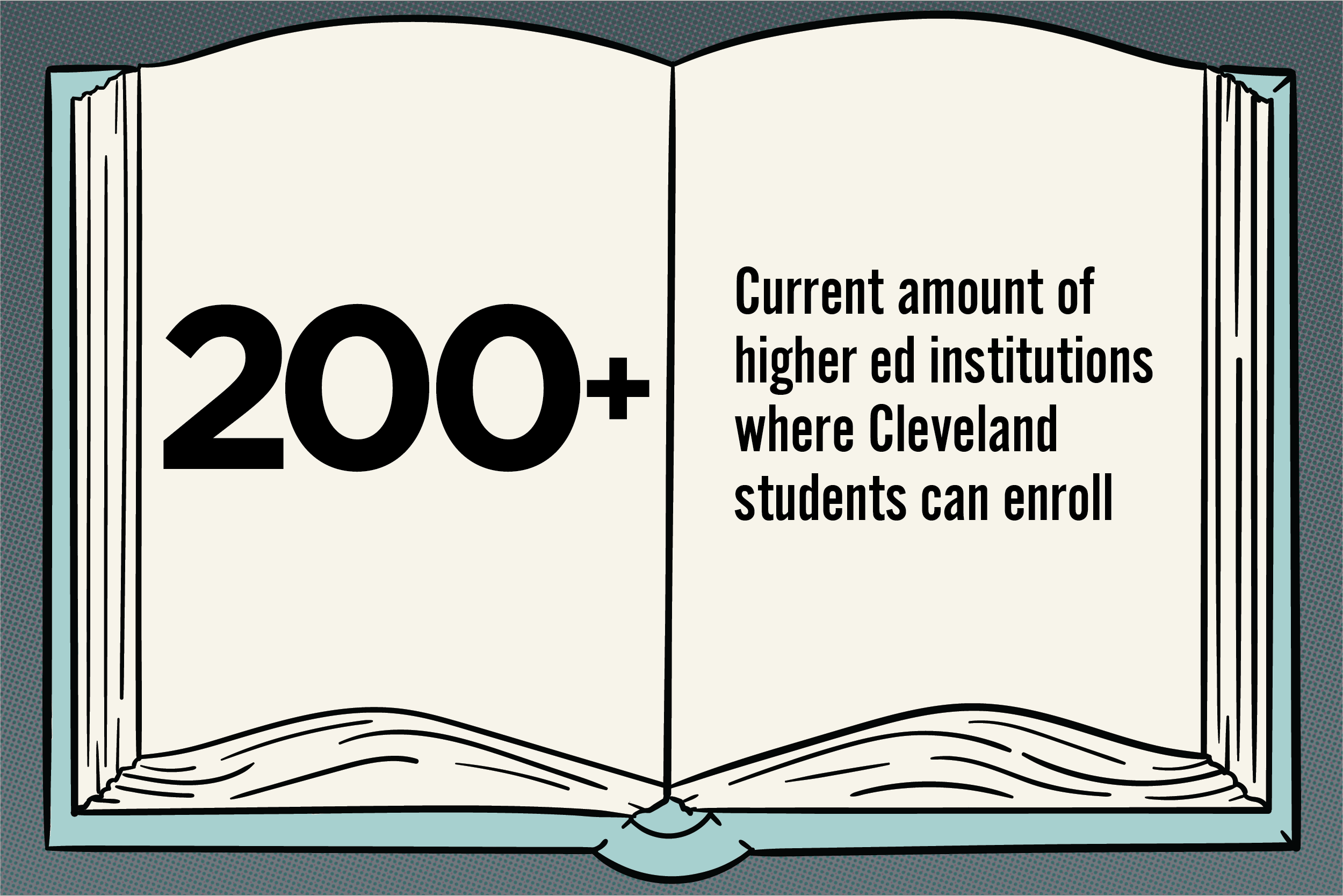In 2019, Cleveland became the fourth city in the country to land and launch a national chapter of the “Say Yes to Education” national initiative, which aims to boost college-going rates.
The city’s chapter helps the district’s graduates access and pay for higher education at a variety of private and public four-year colleges, community colleges, and some trade programs that are eligible for Pell Grant funding.
The initiative also provides a variety of support services. Specialists placed in every CMSD school and partner charter schools provide help and guidance to students and families.
Say Yes also pairs students with mentors once they begin their college career to help navigate that chapter too.
It’s supported by a melting pot of some of the city’s biggest power players, including College Now Greater Cleveland, Cuyahoga County government, and the Cleveland Foundation. (Editor’s note: The Cleveland Foundation is a supporter of Signal Cleveland).
Here’s what parents, students and city residents need to know about navigating the program.
How many students have graduated so far?
The program has now produced nearly 100 graduates since launching in 2019: 20 have earned a certificate, 24 have gotten a four-year degree, and 54 have received a two-year associate’s degree.
Does this mean a blank check for college?
Nope. The program is what’s known as a “last dollar” offering. This means students must complete the federal financial aid form known as the FAFSA and secure as much federal and state aid and/or scholarships as they can. The Say Yes funding kicks in after that.
This funding pool currently only covers tuition costs, not room and board or additional fees. Tuition for new full-time Ohio students starting in fall 2022 at Cleveland State University, for example, is listed at $12,034 for two semesters.
Who is eligible to participate in Say Yes?
Students must continuously live in the city of Cleveland or an approved nearby neighborhood. They need to enroll in a CMSD high school or a partner charter school beginning in ninth grade. They must stay enrolled and graduate. Students can take a gap year (or two, for those who graduated during the pandemic) before enrolling at a higher education institution.
Plus, students coming from families who make over $75,000 annually will receive a $5,000 scholarship, while those whose families make less than that amount are eligible to get tuition and fees covered once all other types of aid are applied.
Where can they go?
Local students can utilize their funding at more than 200 four-year public and private institutions, community colleges, and some approved trade programs across the country. Check out a list of participating institutions here.
As of spring 2022, 1,329 CMSD students were using funding from the group to pay for college or career training.
Parents and students-do you have questions about Say Yes? Our higher education reporter Amy Morona wants to hear them! Share your thoughts by filling out this form.
Speaking of numbers, what are the group’s metrics for success?
The group’s biggest goal, per its executive director, Diane Downing, is to increase the number of post-secondary degrees earned by graduates of CMSD and partnering charter high schools over the next 20 to 25 years.
That’s the long game, though. Downing stresses a conversation about metrics can’t happen without considering the impact of the COVID-19 pandemic on the lives of students. Enrollments at colleges and universities across the country saw big drops during the past few years, and the impacts continue to be felt in a myriad of ways that don’t just change overnight.
“A lot of students had to make choices for their families during the pandemic, and going to work, supporting families, providing necessities, were part of that,” Downing said.
When asked, Downing said the group didn’t establish specific goals beginning in August 2022, though they plan to “monitor the rest of this academic year,” especially with the pandemic-era threat of switching to remote learning removed.
Is Say Yes part of CMSD?
Not exactly.
“While we are based in CMSD and partnering charter schools, we are a separate organization funded by different means,” said Downing.
The district, though, is one of the funders that helps put family support specialists in its schools.
Speaking of, what do those family support specialists do?
The specialists make referrals to other agencies for services such as legal aid and mental health support. From August to December of 2022, for example, those support specialists made 7,500 referrals.
Downing called this group the most important component of Say Yes’ work. The specialists, she said, work to eliminate distractions or challenges that might be part of a student’s or a family’s life. The goal is to help the student concentrate on academics, graduate, and eventually make full use of the higher education scholarship.
Who is paying for this?
Say Yes has raised a reported $98 million for scholarships so far. Officials want to get to $125 million to fully fund the scholarships for a minimum of 25 years.
The scholarship funds are separate from the money used to pay family support specialists, though. There’s currently a funding gap for that program, according to reporting from Signal Cleveland’s Paul Rochford.
How can parents/students/guardians/families get involved?
Find out more information on which family support specialist is designated for each CMSD school by visiting this page on Say Yes’ website. There’s also an online portal to begin the process of applying for a Say Yes scholarship. You can contact Say Yes directly by calling 216-273-6350 or emailing info@SayYesCleveland.org.







